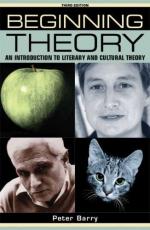
|
| Name: _________________________ | Period: ___________________ |
This quiz consists of 5 multiple choice and 5 short answer questions through Theory before theory - liberal humanism.
Multiple Choice Questions
1. ________ was probably the most influential figure in twentieth-century British criticism according to author Peter Barry.
(a) Patrick Tilley.
(b) Douglas Adams.
(c) F.R. Leavis.
(d) Edward Jablonski.
2. The Introduction states that ________, like novelists, are dauntingly plentiful.
(a) Poets.
(b) Journalists.
(c) Romanticists.
(d) Theorists.
3. The Introduction states that another name for traditional literary criticism is ________.
(a) Conservative humanism.
(b) Modern humanism.
(c) Liberal humanism.
(d) Independant humanism.
4. The narrator explains in the Introduction that the emphasis on practice means that this is what form of book?
(a) Work book.
(b) E-book.
(c) Missal.
(d) Manuscript.
5. The narrator suggests that liberal humanists believe in ________ as something fixed and constant which great literature expresses.
(a) Diegesis.
(b) Human nature.
(c) Horizon of expectation.
(d) Idealism.
Short Answer Questions
1. I.A. Richards pioneered the technique called ________ which was also the title of his book in 1929.
2. Who said the following quote found in the chapter titled Theory Before Theory--Liberal Humanism: "We are told that the study of literature 'cultivates the taste, educates the sympathies and enlarges the mind'"?
3. According to the chapter titled Theory Before Theory--Liberal Humanism, structuralism and post-structuralism originated in what country?
4. Who does the narrator say was the founder of a method of studying English which is still the norm today?
5. In Percy Bysshe Shelley's ________(1821) saw poetry as essentially engaged in what a group of twentieth-century Russian critics later called "defamiliarization."
|
This section contains 252 words (approx. 1 page at 300 words per page) |

|




